How to Store a Lawn Mower Outside Without a Shed: Benefits, Risks, & FAQ
-
Pete Ortiz
- Last updated:
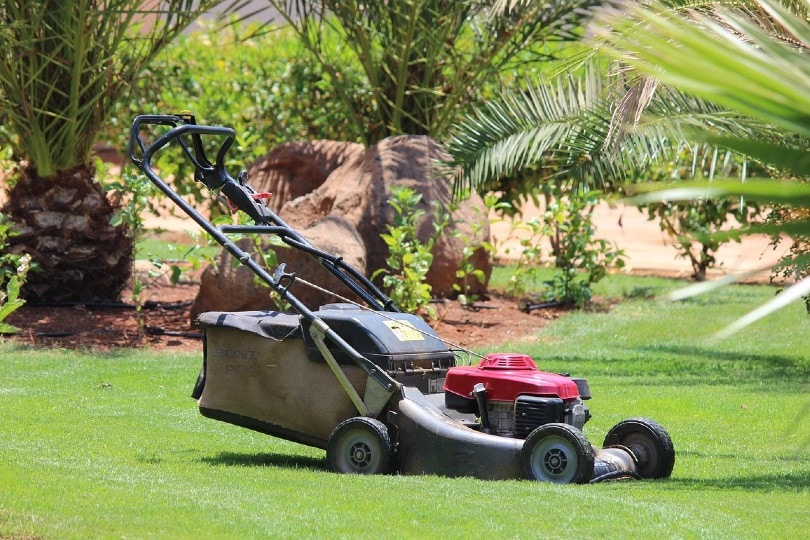
Owning a lawn mower is one thing; storing it properly is another. Both activities are very important, and the latter always affects the former. While more homeowners are buying lawn mowers annually, one reason why some homeowners still have not bought a lawn mower is that they have nowhere to store it.
Read on below for some tips and tricks on properly storing your lawnmower—even if you don’t have a shed.
What is a Lawn Mower Shed?
Lawn mowers are usually stored in a shed. This is a shelter that is designed and built specifically to house the lawn mower when it is not in use.
The shed can have various sizes and shapes depending on a few factors, including the size of the machine. Most times, the shed is built with enough space to also accommodate the tools, equipment, and materials that work together with the machine.
Originally, sheds were built as a permanent structure while erecting houses. However, in recent times, sheds are temporary and portable structures that can be moved from place to place. They are now more aesthetically pleasing, designed to blend in with your building and environment in a way that does not make it an eyesore. They are often made from tarpaulin fabric with steel frames.
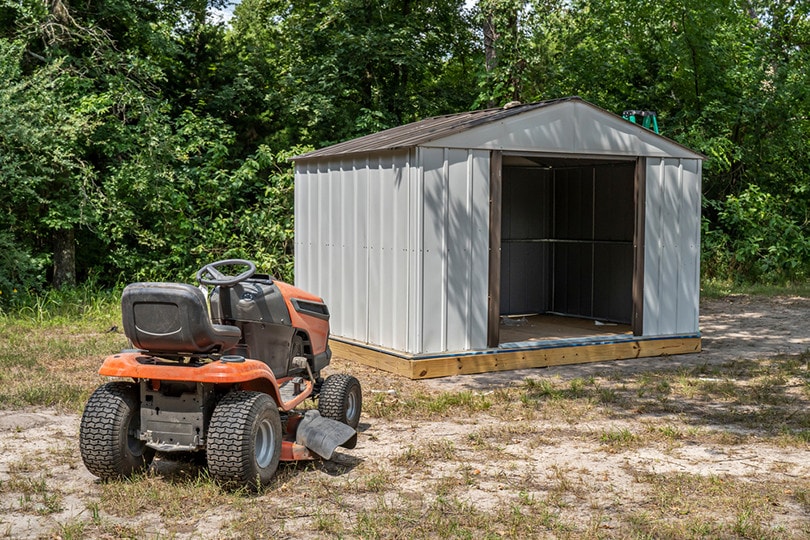
Benefits of Storing Your Lawn Mower in a Shed
- It shields the machine from harsh weather conditions.
- A lawn mower shed in good condition will increase the value of your property.
- You can protect your tools from prying eyes or children’s reach by locking them up safely in a shed.
- The likelihood of you having your equipment and materials scattered around the backyard in your compound reduces. A shed will reduce clutter and keep your compound in order. You can worry less about losing important machine tools.
- The shed can double as your tool storage space and workspace for other hands-on activities.
Possible Consequences of Storing Your Lawn Mower Outside Without a Shed
Lawn mowers are made for outdoor purposes, yes. However, this, like everything else, should be done in moderation. Leaving your lawn mower outside without a shed for a couple of days might have no consequences. But after a while, you will certainly see negative effects, including:
- Rusting: Lawn mowers have some metallic parts, and when constantly exposed to water and air, they start to rust. A rusted lawn mower does not look nice, and this will tend to reduce the value of the machine.
- Potential damage to components: When rain, snow, and sun constantly fall on a lawn mower, the components will start failing.
- The spark plug can get wet, thus losing its ability to supply power from the engine and battery.
- The engine can collect water, affecting the combustion process needed for the machine to function.
- The blades can become dull and sustain cracks and holes.
- The plastic parts of the machine can get degraded.
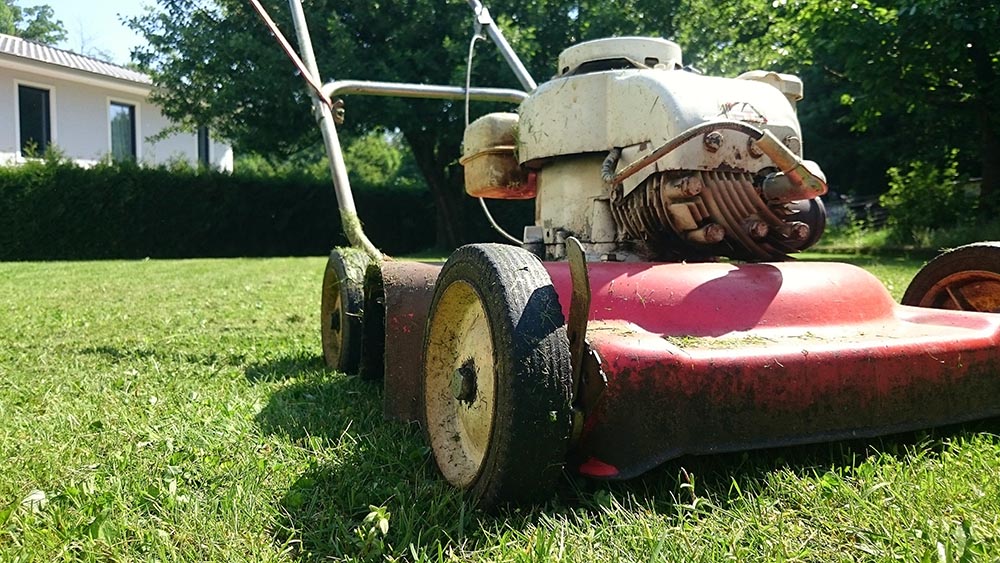
Factors to Consider When Storing Your Lawn Mower
- The type of lawn mower
- The particular weather conditions in your location
- Storage timeframe
There are three main types of lawnmowers. Each of these machines has different storage methods that are suitable for them.
The table below will compare the lawn mower types, their most suitable storage method, and the reasons.
| Mower Type | Precaution | Reason |
| Gasoline Mower | The fuel tank should be removed after use and stored away from heat. | The fuel may leak and cause a fire. |
| Electric Mower | The vital part of this mower is the power cable. Therefore, this mower should be stored far away from water. | Water is a good conductor of electricity; you do not want these two to meet. |
| Battery-operated Mower | The battery should be removed from the machine and is best stored at room temperature in a dry place. | The battery of a lawn mower is not built to stay in a compartment for a long time. |
Your Location and Weather Condition and How it Affects Your Storage
| Weather condition | Effect |
| Sun | Lawn mowers can take a little sun. That is what they were made for, after all.
Sun does not have much negative effect on the machine except for the plastic parts, which are susceptible to becoming more brittle and losing color. |
| Rain | The rain is not good for your mower, although it is tough enough to take a bit of moisture.
Most mowers are built with decks that shield the vital housing areas like the gas and oil tanks and the engine.
However, when the rain is much, or the machine is constantly left in the rain, the fuel tank will likely collect some water and damage the combustion process.
It could also lead to rusting of the body of the machine. |
| Winter | Most homeowners winterize their mowers. This means that the machine takes a break all through the winter season.
Besides the obvious fact that it is extremely difficult to mow any lawn in winter, dirt and debris will likely find their way into any idle hose, causing blockages when the machine is ready to be used again.
Your engine and other parts of the lawn mower will suffer serious freezing if left outside unprotected in winter. |
- See Also: 5 Tips to Winterizing Your Lawnmower
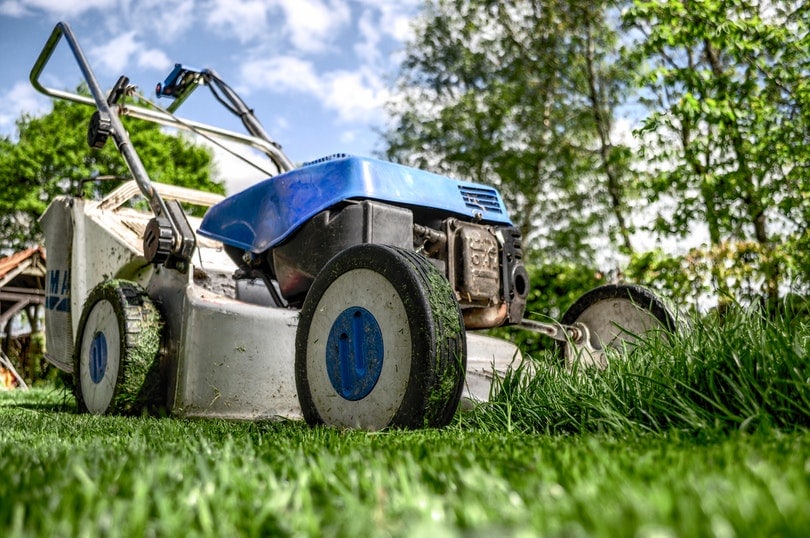
Storage Timeframe
If you are looking to store your lawn mower for the week before it resumes duty the next time your lawn needs a haircut, then the storage procedure will be different from one who is looking to store the machine for a longer period.
Short-Term Storage:
If you are doing short-term storage, it requires fewer precautions since the fuel would not have degraded during this time, the engine should still be lubricated, and its components will not be wet.
Here are some storage methods that you can adopt if you are looking to store your machine short term.
- Use a pop-up tent
- Cover it with a tarp or waterproof cover
- Use a plastic storage box
- Store it under a tree
- Store it under an overhang
- Related read: How to Start a Lawn Mower: 13 Tips and Tricks
Long-Term Storage:
When storing long-term, you will need to take some extra precautions. Here are some important activities you should perform;
- Empty the mower’s tank if it is gas-powered. Leaving fuel in the tank for a long duration can be harmful. While you are at it, also remove the remaining oil.
- Remove the spark plug and keep it in a safe, dry place.
- Clean the machine before storing it. Remove dirt, debris, and grass clippings attached to the blade and other parts.
- Remove the blades and keep them in a safe place.
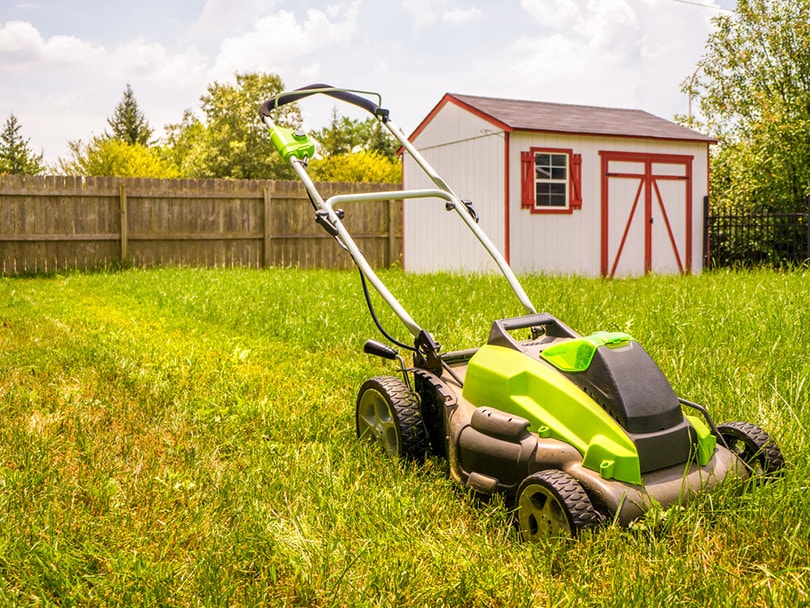
The 3 Tips & Tricks for Storing Your Lawn Mower Outside
- Use a lawn mower cover: One of the easiest ways to protect your mower is to cover it up with a lawn mower cover. There are several varieties of covers available in different sizes, colors, and materials. You can choose the most suitable cover for your machine and purchase it. When it is safely covered, you do not have to worry about nature’s elements destroying your machine.
- Under a porch: A porch is not exactly as efficient as a shed when it comes to storing your mower, but it works to protect it from harsh weather, especially if it has side walls. In addition, it can keep your mower hidden while protecting it.
- Build a DIY storage box for your mower: With some basic tools and proper guidance, you can build a storage box for your mower that actually works.
- Related Read: 10 Best Lawn Mowers under $300: Reviews & Top Picks
Conclusion
A shed is a perfect way to store a lawn mower for most homeowners. However, in the absence of one, you could adopt any of these options, and they will still serve the function well.
See also:
Featured Image Credit: kikatani, Pixabay
Contents


